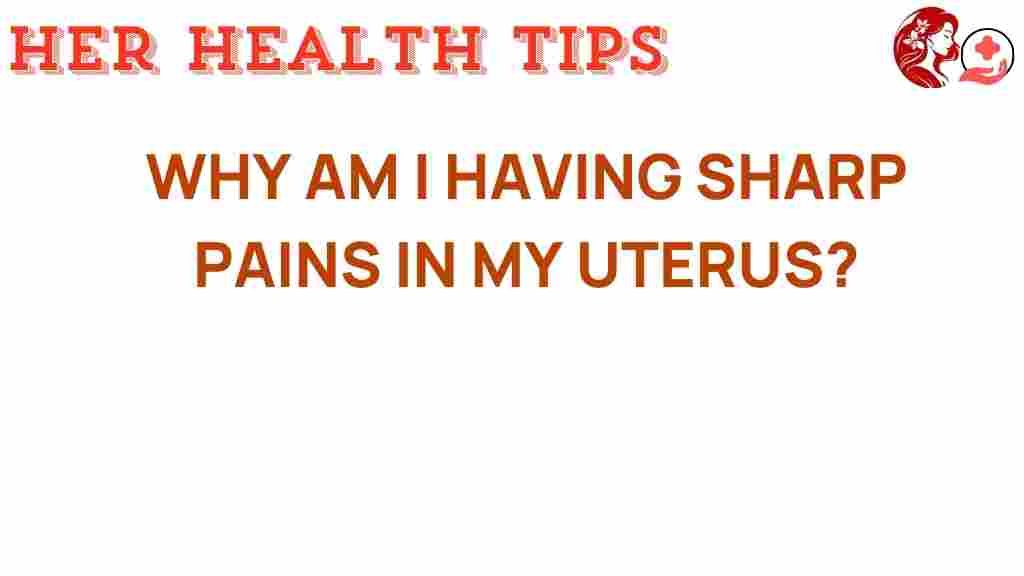Unraveling the Mystery: What Causes Sharp Uterine Pain?
Sharp uterine pain can be a distressing experience for many women, often leading to confusion and concern regarding its underlying causes. Understanding the causes of uterine pain is crucial for maintaining women’s health and ensuring proper reproductive health. This article explores the various reasons behind sharp uterine pain, differentiates it from menstrual cramps and pelvic pain, and provides essential information on diagnosis and treatment options.
Understanding Sharp Uterine Pain
Sharp uterine pain can manifest in various forms, ranging from mild discomfort to severe, debilitating pain. It is essential to identify the nature of this pain and its potential causes.
What is Sharp Uterine Pain?
Sharp uterine pain typically refers to sudden, intense pain felt in the lower abdomen or pelvic region. It can be acute or chronic and may vary in intensity. This type of pain can be linked to different conditions affecting the uterus and surrounding reproductive organs.
Common Symptoms Associated with Sharp Uterine Pain
Alongside sharp uterine pain, women may experience a range of symptoms, including:
- Abdominal cramping
- Nausea or vomiting
- Heavy menstrual bleeding
- Fever or chills
- Pain during intercourse
- Unusual vaginal discharge
If you experience any of these symptoms, particularly if the pain is severe or persistent, it is essential to seek medical attention.
Causes of Uterine Pain
Identifying the causes of uterine pain is fundamental for effective treatment. There are several potential reasons for sharp uterine pain, which can be categorized into physiological and pathological causes.
Physiological Causes
Some common physiological causes of sharp uterine pain include:
- Menstrual Cramps: Also known as dysmenorrhea, these cramps are caused by contractions of the uterus during menstruation. While they are usually not sharp, some women may experience intense discomfort.
- Ovulation Pain: Some women feel a sharp pain during ovulation, which is known as mittelschmerz. This pain occurs when an ovary releases an egg.
Pathological Causes
Pathological causes of sharp uterine pain can range from benign to serious conditions, including:
- Uterine Fibroids: These non-cancerous growths in the uterus can cause severe pain, especially if they grow large or become fibrous.
- Endometriosis: A condition where tissue similar to the uterine lining grows outside the uterus, leading to significant pain and discomfort.
- Pelvic Inflammatory Disease (PID): An infection of the female reproductive organs that can cause sharp and persistent pelvic pain.
- Ectopic Pregnancy: A potentially life-threatening condition where a fertilized egg implants outside the uterus, leading to severe abdominal pain.
- Uterine Cancer: Although rare, sharp uterine pain can be a symptom of cancer, especially if accompanied by abnormal bleeding.
Diagnosing Sharp Uterine Pain
When experiencing sharp uterine pain, it is crucial to obtain an accurate diagnosis. A healthcare provider will typically conduct the following:
Step-by-Step Diagnostic Process
- Medical History Review: The doctor will inquire about your health history, menstrual cycle, and any additional symptoms you may be experiencing.
- Physical Examination: A pelvic examination may be performed to check for any abnormalities in the reproductive organs.
- Imaging Tests: Ultrasound or MRI scans can help visualize the uterus and surrounding organs to identify any structural issues.
- Laboratory Tests: Blood tests may be conducted to check for infections, hormonal imbalances, or other health conditions.
Accurate diagnosis is essential for determining the appropriate treatment options for uterine pain.
Treatment Options for Sharp Uterine Pain
Once a diagnosis has been made, various treatment options are available, depending on the underlying cause of the sharp uterine pain.
Conservative Treatments
- Medications: Over-the-counter pain relievers, such as ibuprofen or acetaminophen, can help alleviate pain. In cases of severe menstrual cramps, doctors may prescribe stronger medications.
- Heat Therapy: Applying heat to the abdomen can ease muscle tension and reduce pain.
- Lifestyle Changes: Regular exercise, a balanced diet, and stress management techniques can improve overall reproductive health.
Medical Treatments
- Hormonal Therapies: Birth control pills or hormone-based therapies can help regulate menstrual cycles and reduce pain associated with conditions like endometriosis.
- Surgical Options: In cases where fibroids or other growths cause severe pain, surgical intervention may be necessary to remove them.
- Antibiotics: If sharp uterine pain is due to an infection, antibiotics may be prescribed to treat the underlying cause.
Troubleshooting Tips for Managing Sharp Uterine Pain
While seeking medical treatment is essential, there are also some self-care strategies you can employ to manage sharp uterine pain:
- Track Your Symptoms: Keeping a journal of your pain episodes can help identify patterns and triggers, aiding in diagnosis.
- Practice Relaxation Techniques: Mindfulness, yoga, or breathing exercises can help reduce stress and alleviate pain.
- Stay Hydrated: Drinking plenty of water can help prevent bloating and cramping.
While self-care strategies can provide relief, they should not replace professional medical advice. Always consult with a healthcare provider for persistent or severe symptoms.
Conclusion
Sharp uterine pain can be a complex issue, influenced by various physiological and pathological factors. Understanding the causes of uterine pain is crucial for effective diagnosis and treatment, ultimately improving women’s health and reproductive health. Whether it’s due to menstrual cramps, fibroids, or more serious conditions, timely medical intervention is vital. If you are experiencing sharp uterine pain, don’t hesitate to reach out to a healthcare professional for guidance and support.
For more information on related health topics, you can check out this comprehensive guide on women’s health. Remember, your health matters!
For additional resources, visit the Mayo Clinic for expert advice and information.
This article is in the category Reproductive and created by HerHealthTips Team
